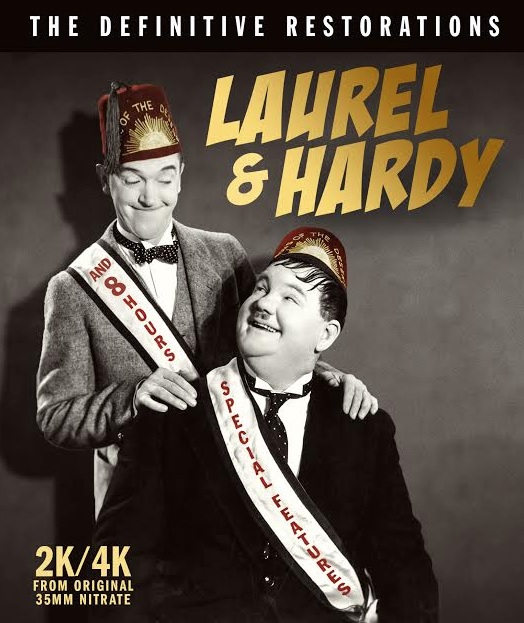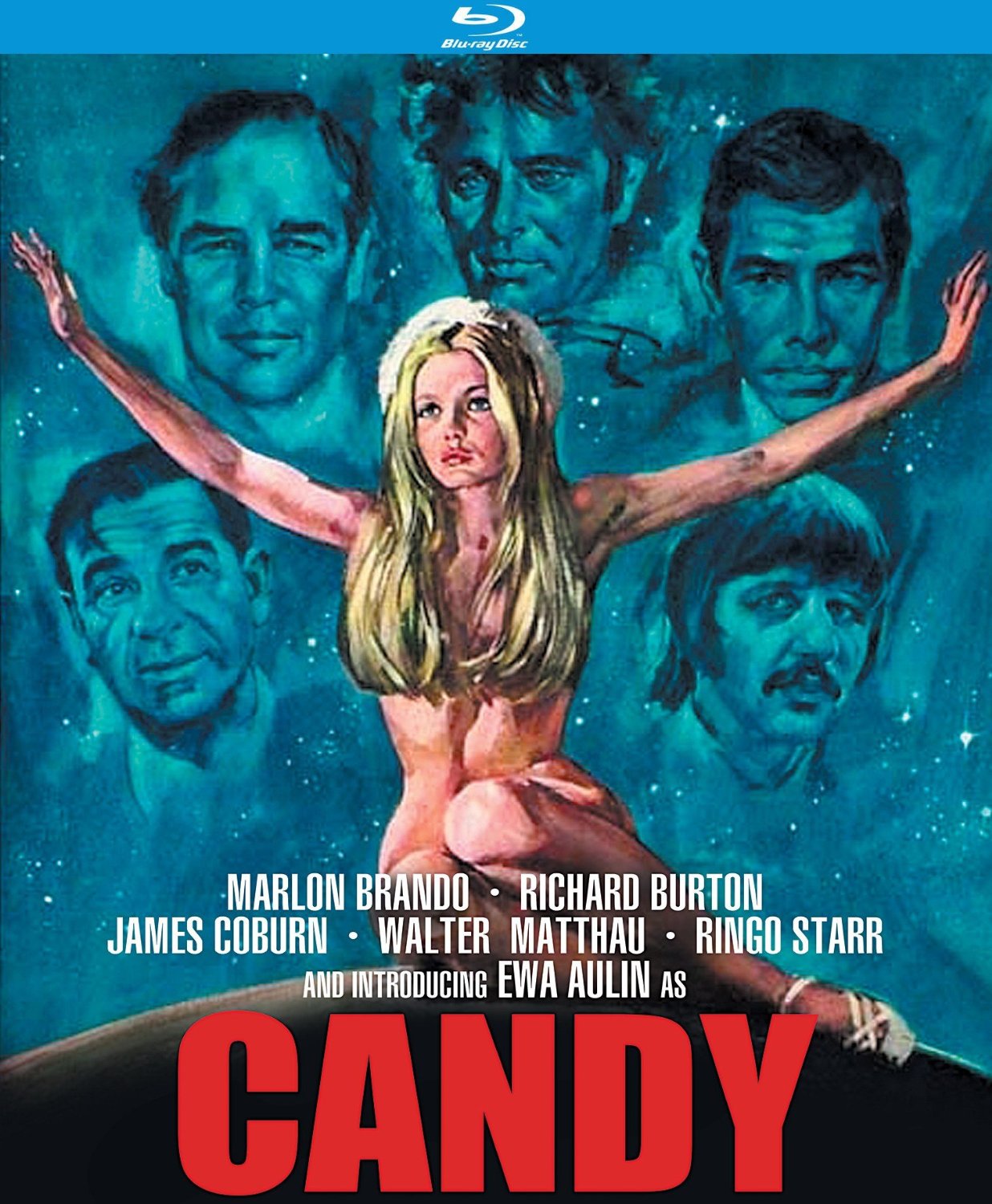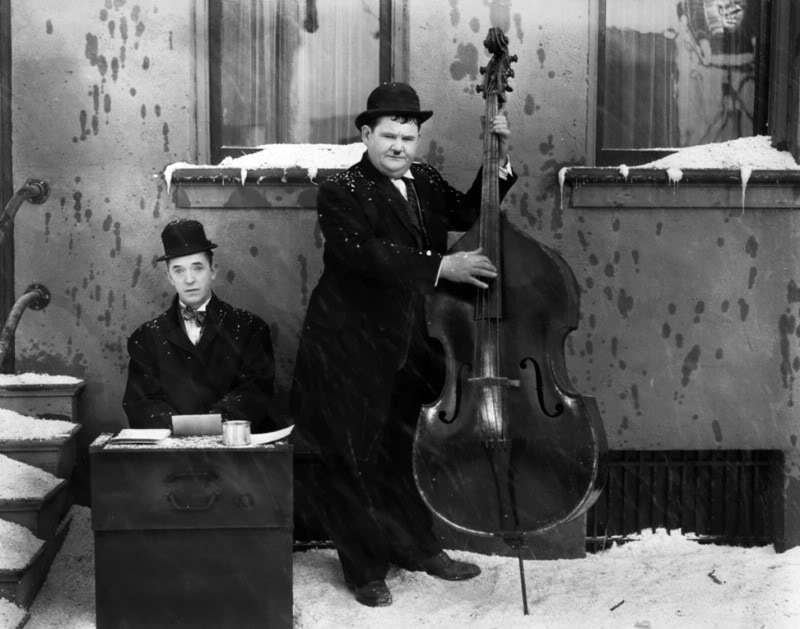THE LAUREL & HARDY
FUN HOUSE
Back we go to the HAL ROACH LOT of FUN!
One of the more popular sections of our first incarnation of In The Balcony more than a decade ago was the Laurel & Hardy Fun House, in which we acquired a complete set of L&H silent and sound films and wrote about them until we simply couldn’t write any more. Since then, we’ve had many requests to revive the series, and your wishes have been granted for this holiday season.
Much has changed over the past couple of years; back then, we had to order discs from Germany to obtain nearly all of the Laurel & Hardy films, with some bonus Hal Roach shorts included. Now, thanks to a variety of our favorite DVD companies, a great deal of the prime Roach output is readily available and much appreciated by lovers of classic comedy.
Here is where to start to collect the available films.
Laurel & Hardy
The single most important set you can purchase, comedy fans, is called Laurel & Hardy: The Essential Collection (RHI $99.98, but about half that online). This 10-disc set includes nearly all of the prime L&H shorts and features of the sound era, including the Oscar®-winning The Music Box, Men o’ War, The Bohemian Girl, Way Out West, Sons of the Desert, and dozens more, plus seven foreign-language shorts with the Boys speaking their dialog phonetically, bonus featurettes, and additional shorts with guest appearances by Stan & Ollie.
Laurel & Hardy’s silent teamings are owned by a different company; they were released by Image Entertainment in a ten-volume set called The Lost Films of Laurel & Hardy twenty years ago, and are long out of print but worth seeking out on eBay to find such classics as Big Business, Liberty, and Love ‘em and Weep.
Finally, Warner Bros. owns most of the MGM library, and released a pair of popular L&H features in a set called TCM Archive: Laurel & Hardy Collection, also out of print but recommended. It includes The Devil’s Brother (Fra Diavolo) and Bonnie Scotland, plus bonus material.
Away from the Roach studio, L&H made one film very much worth having, RKO’s The Flying Deuces, which is available on restored Blu-ray from VCI Entertainment.
Five L&H classics are being released on Blu-ray this month from Universal in England, and we hear the discs are region free, meaning they'll play in U.S. players. More on that soon.
Our Gang
From 1922-1938, Roach produced a popular series of short subjects (and one feature) starring the Our Gang kids, who became known as the beloved Little Rascals when they were sold to television.
The only official release of Our Gang silent films comes from Germany: Kinowelt’s Die Kleinen Stroiche 1927-1929 includes the 14 films from those years that still exist (several, unfortunately, are lost).
In 2008, Genius Entertainment released a box set called The Little Rascals: The Complete Collection, with all the Our Gang talkie shorts from 1929-1938, but they somewhat botched the job, with incorrect/reissued credits on some of the shorts. That was corrected for a budget series called simply The Little Rascals (Vols. 1-7), RHI, less than ten bucks each, which presented the same shorts only in much better versions.
From 1938-1944, MGM continued the Our Gang series without Hal Roach; those 52 shorts are available ($47.99) from the Warner Archive, as is the feature General Spanky (1936).
Charley Chase
Long considered the “forgotten man” of comedy, Chase was a longtime favorite for Roach, working steadily from the early ‘20s through 1936, after which he moved over to Columbia Pictures where he worked as a writer, director, and star until his early death in 1940.
VCI Entertainment released a wonderful boxed set of early Chase comedies, Becoming Charley Chase, with more than 40 short subjects, and Kino gave us two volumes of Slapstick Symposium shorts with 12 Charley comedies from the Hal Roach days, including such laugh-riots as Mighty Like a Moose and Long Fliv the King.
A handful of Roach talkies were released on VHS in the early days of that format, but finally last year we were gifted with Charley Chase at Hal Roach: The Talkies Vol. 1 1930-31, with 17 shorts, a bonus Spanish-language short, and bonus material. Includes a film generally considered Chase’s funniest talkie short, The Pip from Pittsburg. We are keeping our fingers crossed for future volumes in this series.
Chase’s Columbia shorts have been compiled in two volumes available from the Sony Choice Manufactured-on-Demand (MOD) program.
Thelma Todd
The beautiful and hilarious Thelma Todd, who also made pictures with Laurel & Hardy, the Marx Bros., and Buster Keaton, was Charley’s most frequent leading lady in the early ‘30s, leading to her paired with co-stars in Roach’s attempt to build a “female Laurel & Hardy team.” Her 17 shorts subjects paired with Zasu Pitts are now available in the aptly titled Thelma Todd & Zasu Pitts: The Hal Roach Collection 1931-1933 (Kit Parker, $32.49). When Zasu left the Roach lot, she was replaced in the films by Patsy Kelly, and so we have The Complete Hal Roach Thelma Todd – Patsy Kelly Comedy Collection ($39.99) includes all 21 films in that series plus three shorts with Patsy paired with other women in 1936 after Miss Todd’s mysterious death.
Other
A few years ago, The Filmmuseum in Germany released a valuable pair of boxed sets with Hal Roach stars. Max Davidson Comedies includes 11 silents (1927-28) starring the popular Jewish stereotyped comic, plus the Roach All Star comedy, one of the first talkies made by Roach, Hurdy Gurdy (1929), and a rare 1931 talkie, The Itching Hour. Female Comedy Teams offers several of the Thelma Todd/Pitts/Kelly comedies plus two silent comedies with Roach’s first attempt at a female Laurel & Hardy, Marion Byron and Anita Garvin.
Moving forward, as we review these films, resources for this retrospective will include a number of terrific books in the Balcony library, including Randy Skretvedt's Laurel & Hardy: The Magic Behind the Movies; Richard Lewis Ward's A History of the Hal Roach Studio; William K. Everson's The Complete Films of Laurel & Hardy; Bill Cassara's & Richard S. Greene's Henry Brandon: King of the Bogeymen, and Leonard Maltin's & Richard W. Bann's The Little Rascals.
A Little About Mr. Roach
Hal Roach signed a contract with Metro-Goldwyn-Mayer in 1926, agreeing to provide ten shorts per year in four series: Our Gang, Charley Chase, Max Davidson, and the Hal Roach All-Stars, which more and more were becoming a vehicle for Stan Laurel and Oliver Hardy. For the 1928-29 season of shorts, Laurel & Hardy officially left the All Star series and replaced Max Davidson, whose over-the-top ethnic comedy bothered Louie B. Mayer of MGM. The big change came in early 1929, when the studio shut down temporarily while sound stages were built – talking pictures had hit the Lot of Fun. Beginning in May of ’29 and commencing through the rest of the year, new talking pictures would be released by Roach alternating with previously unreleased silent films.
The first of the talking pictures to be released was an Our Gang three reeler, Small Talk, in April of ’29, produced and directed by Robert F. McGowan, who must’ve had a time: most of the kids couldn’t read scripts, and with the coming of sound, he couldn’t give them verbal directions. He would have to sketch out verbally what he wanted them to do and let them fly with it; luckily, the kids are so talented they pulled it off very well. In this short, they’re spinach-hating orphans happy that li’l Wheezer is finally getting adopted, but his absence makes big sister Mary Ann so upset that the kids go visit him and end up disrupting his new family’s lawn party. Luckily, Wheezer’s new mama talks her friends into adopting all the children (the Negro maid adopts Farina). At this time, the kids in the gang included Farina, age 8; Joe, age 11; Jean, age 6; Harry, age 7; Wheezer, age 4; and Mary Ann, age 6. Small Talk may not be the best Our Gang short (it surely isn’t) but it ranks as one of the noisiest, with an opening scene of the Gang off camera pounding on musical instruments and the cacophony rarely letting up: virtually every scene has talking, noise, chirping mechanical birds, sirens, squawking parrots, and too-loud radios. Audiences wanted SOUND, well, they sure did GET it.
Laurel & Hardy in Big Business (4/29) Dir. James W. Horne; silent, 2 reels
Laurel & Hardy were peaking, and it's even more impressive to know that they were simply churning out comedies to beat the studio shutdown. According to Randy Skretvedt, this was hastily written and filmed in just a couple of weeks in December of '28. This is the one where Stan 'n' Ollie are door-to-door Christmas tree salesmen who end up destroying James Finlayson's house while he tears their car to pieces, and it's one of the great works in comedy film history. If you call this L&H’s greatest film, it would be hard to argue with you.
(You may have heard they went to the wrong house to wreck it; not true, but a great legend. The house still exists today, the owners are aware of its significance in movie history, and it still looks pretty much the same.)
Our Gang in Fast Freight (5/29) Dir. Anthony Mack; silent, 2 reels
Farina and his dog Petey are ridin' the rails from Alabama to California, where the streets are paved with gold (and he intends to become a street sweeper). He has a drill to drill up through the floor of the train and catch whatever drops from the baggage car into his lap, and when its jellybeans (and MY weren't jelly beans HUGE in those days) or gum drops, well and good, but when it's bees, not so much. At a stop, he meets the Gang playing musical instruments on a Saturday and invites them to skip music lessons and come join him; they all end up at the next stop in a haunted house.
A not-too-good Our Gang short; the train sequences are fun but the haunted house seems an act of desperation to wrap this all up.
Charley Chase in Movie Night (5/29) Dir. Lewis Foster
Come hell or high water, Charley takes his wife, brother-in-law, and daughter to the movies every Monday night, and the water is VERY high this week. First, the daughter has hiccups; then, Charley's attempts to pass Spec O'Donnell off as under seven and half-price runs afoul of the "kid's" burgeoning mustache; then Charley catches the hiccups and has to deal with trying to get a drink of water during the movie.
Very, very funny short. Tiny Sandford is the grumpy theatre manager with his eye on Charley; a highlight is the give-away (Mrs. Ginsberg wins a ham, Charley wins a live duck) and the great MGM movie posters adorning the lobby (including The Cameraman and A Woman of Affairs).
Fast Freight and Movie Night are from German DVDs; Big Business is on The Lost Films of Laurel & Hardy Vol. 1; Small Talk is from The Little Rascals Vol. 1.
Next, more on Laurel & Hardy and the rest of the Hal Rouch ensemble, plus more reviews!











